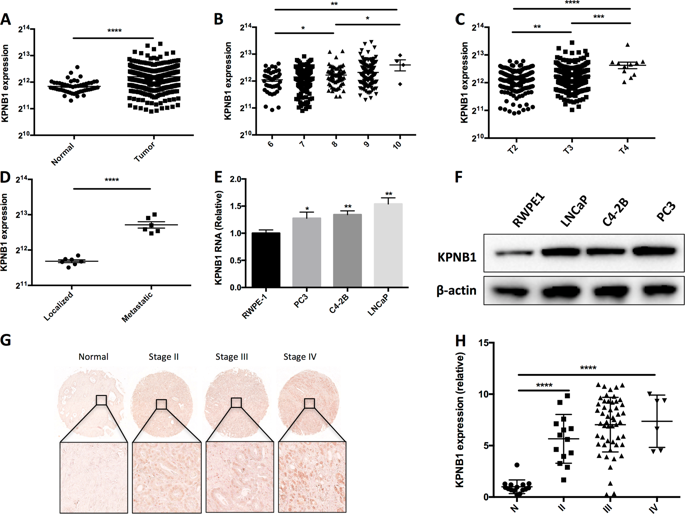Our official English website, www.x-mol.net, welcomes your
feedback! (Note: you will need to create a separate account there.)
Inhibition of Karyopherin beta 1 suppresses prostate cancer growth.
Oncogene ( IF 6.9 ) Pub Date : 2019-02-11 , DOI: 10.1038/s41388-019-0745-2 Jian Yang 1 , Yuqi Guo 1 , Cuijie Lu 1 , Ruohan Zhang 1 , Yaoyu Wang 1 , Liang Luo 1 , Yanli Zhang 1 , Catherine H Chu 1 , Katherine J Wang 1 , Sabrine Obbad 1 , Wenbo Yan 1 , Xin Li 1, 2, 3
Oncogene ( IF 6.9 ) Pub Date : 2019-02-11 , DOI: 10.1038/s41388-019-0745-2 Jian Yang 1 , Yuqi Guo 1 , Cuijie Lu 1 , Ruohan Zhang 1 , Yaoyu Wang 1 , Liang Luo 1 , Yanli Zhang 1 , Catherine H Chu 1 , Katherine J Wang 1 , Sabrine Obbad 1 , Wenbo Yan 1 , Xin Li 1, 2, 3
Affiliation

|
Prostate cancer (PCa) initiation and progression requires activation of numerous oncogenic signaling pathways. Nuclear-cytoplasmic transport of oncogenic factors is mediated by Karyopherin proteins during cell transformation. However, the role of nuclear transporter proteins in PCa progression has not been well defined. Here, we report that the KPNB1, a key member of Karyopherin beta subunits, is highly expressed in advanced prostate cancers. Further study showed that targeting KPNB1 suppressed the proliferation of prostate cancer cells. The knockdown of KPNB1 reduced nuclear translocation of c-Myc, the expression of downstream cell cycle modulators, and phosphorylation of regulator of chromatin condensation 1 (RCC1), a key protein for spindle assembly during mitosis. Meanwhile, CHIP assay demonstrated the binding of c-Myc to KPNB1 promoter region, which indicated a positive feedback regulation of KPNB1 expression mediated by the c-Myc. In addition, NF-κB subunit p50 translocation to nuclei was blocked by KPNB1 inhibition, which led to an increase in apoptosis and a decrease in tumor sphere formation of PCa cells. Furthermore, subcutaneous xenograft tumor models with a stable knockdown of KPNB1 in C42B PCa cells validated that the inhibition of KPNB1 could suppress the growth of prostate tumor in vivo. Moreover, the intravenously administration of importazole, a specific inhibitor for KPNB1, effectively reduced PCa tumor size and weight in mice inoculated with PC3 PCa cells. In summary, our data established the functional link between KPNB1 and PCa prone c-Myc, NF-kB, and cell cycle modulators. More importantly, inhibition of KPNB1 could be a new therapeutic target for PCa treatment.
中文翻译:

抑制karyopherin beta 1抑制前列腺癌的增长。
前列腺癌(PCa)的发生和发展需要激活多种致癌信号通路。致癌因子的核细胞质运输是在细胞转化过程中由核磷脂蛋白介导的。但是,核转运蛋白在PCa进程中的作用尚未明确。在这里,我们报告KPNB1,Karyopherinβ亚基的关键成员,在晚期前列腺癌中高度表达。进一步的研究表明,靶向KPNB1可抑制前列腺癌细胞的增殖。敲低KPNB1可减少c-Myc的核易位,下游细胞周期调节剂的表达以及染色质浓缩1(RCC1)的调节子的磷酸化,RCC1是有丝分裂期间纺锤体组装的关键蛋白。同时,CHIP分析证明了c-Myc与KPNB1启动子区域的结合,这表明由c-Myc介导的KPNB1表达的正反馈调节。此外,KPNB1抑制阻止了NF-κB亚基p50易位至核,从而导致PCa细胞凋亡增加和肿瘤球形成减少。此外,在C42B PCa细胞中具有稳定敲低KPNB1的皮下异种移植肿瘤模型证实,抑制KPNB1可以抑制体内前列腺肿瘤的生长。此外,静脉内注射Importazole是KPNB1的特异性抑制剂,可有效减少接种PC3 PCa细胞的小鼠的PCa肿瘤大小和重量。总之,我们的数据建立了KPNB1与PCa易感c-Myc,NF-kB和细胞周期调节剂之间的功能联系。更重要的是,抑制KPNB1可能成为PCa治疗的新治疗靶点。
更新日期:2019-02-11
中文翻译:

抑制karyopherin beta 1抑制前列腺癌的增长。
前列腺癌(PCa)的发生和发展需要激活多种致癌信号通路。致癌因子的核细胞质运输是在细胞转化过程中由核磷脂蛋白介导的。但是,核转运蛋白在PCa进程中的作用尚未明确。在这里,我们报告KPNB1,Karyopherinβ亚基的关键成员,在晚期前列腺癌中高度表达。进一步的研究表明,靶向KPNB1可抑制前列腺癌细胞的增殖。敲低KPNB1可减少c-Myc的核易位,下游细胞周期调节剂的表达以及染色质浓缩1(RCC1)的调节子的磷酸化,RCC1是有丝分裂期间纺锤体组装的关键蛋白。同时,CHIP分析证明了c-Myc与KPNB1启动子区域的结合,这表明由c-Myc介导的KPNB1表达的正反馈调节。此外,KPNB1抑制阻止了NF-κB亚基p50易位至核,从而导致PCa细胞凋亡增加和肿瘤球形成减少。此外,在C42B PCa细胞中具有稳定敲低KPNB1的皮下异种移植肿瘤模型证实,抑制KPNB1可以抑制体内前列腺肿瘤的生长。此外,静脉内注射Importazole是KPNB1的特异性抑制剂,可有效减少接种PC3 PCa细胞的小鼠的PCa肿瘤大小和重量。总之,我们的数据建立了KPNB1与PCa易感c-Myc,NF-kB和细胞周期调节剂之间的功能联系。更重要的是,抑制KPNB1可能成为PCa治疗的新治疗靶点。










































 京公网安备 11010802027423号
京公网安备 11010802027423号